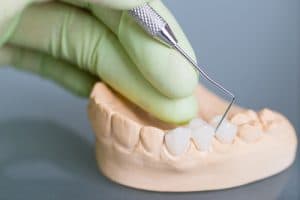 When people imagine dental implants, they usually picture a single tooth option. However, we have alternatives that can address advanced tooth loss. Depending on the state of you smile, we may recommend an implant bridge or denture. Which one will be right for you? How do they differ?
When people imagine dental implants, they usually picture a single tooth option. However, we have alternatives that can address advanced tooth loss. Depending on the state of you smile, we may recommend an implant bridge or denture. Which one will be right for you? How do they differ?
The Dangers Tooth Loss Can Pose
First, tooth loss can have a negative impact on your appearance and as a result, your overall confidence levels. Advanced tooth loss can also mean you must subsist mainly on a diet of soft foods, depriving your body of crucial nutrients. Your remaining teeth can drift form their positions as a result of a gap in the smile, making misalignment more likely.
Finally, once your body registers the loss of a tooth root, it can suspend the flow of key nutrients to the jawbone. With regular doses of calcium and phosphorus, the jawbone can dissolve and lead to further tooth loss, as well as an aged appearance.
Implant Bridges
An implant bridge, like a traditional one, can replace between one and three teeth in a row. However, instead of relying on crowns and requiring surrounding teeth to lose structure, we secure them with multiple dental implant. The prosthetic is then fixed securely in place, can last significantly longer than a traditional bridge, and the implants stimulate jawbone growth to prevent an aged appearance due to facial collapse.
Implant Dentures
We can also replace all of your teeth using a full denture. Instead of requiring suction or an adhesive, the prosthetic will snap onto a series of dental implants. Traditional implant dentures require between six and eight implants. However, with all-on-4 we can often secure a prosthesis with just four specially placed ones, which often helps people that have already experienced loss of jawbone tissue.




Recent Comments